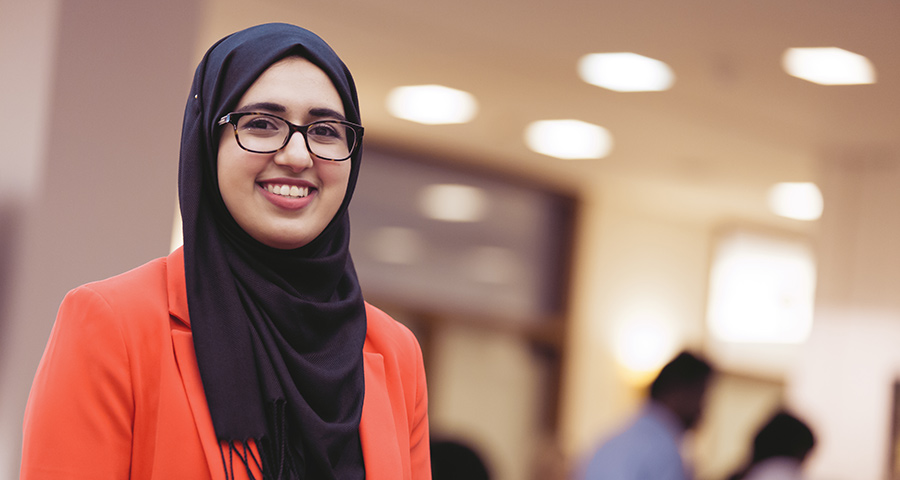
Fatima Amir on her CMU-Q experience: “As a senior, you look back at your freshman self and say, wow, that growth has been kind of crazy.”
Fatima Amir graduated in 2016 from the Biological Sciences Program, and went on to pursue her master’s degree in genetic counseling at the University of Cincinnati. Today she works as a cancer genetics counselor at the Dana-Farber Cancer Institute in Boston.
How did you figure out that you wanted to be a genetics counselor?
When I came to CMU-Q, I didn’t really know what I was going to be doing. I at first thought maybe dental school was something I wanted to do. But then as I learned about genetic counseling, I was like, wait a second, I like this a lot more than looking at people’s teeth.
It’s not a field that people immediately think of as a career option.
I wanted to learn more about it, so I made use of our Pittsburgh campus. I took a clinical psychology class there, and through that, I set up an observership and shadowed this genetic counselor for about a month. Through this process, I discovered the field.
What does a genetic counselor do?
I see patients who have a history that could suggest they have a hereditary cancer syndrome. I take their medical and family history and I help them really understand what the process of genetic testing looks like. Once we move forward with testing, I deliver the results and make sure they get the appropriate follow-up care.
Did you feel that CMU-Q prepared you for your career?
The Bio Sci program here has such a big emphasis on molecular biology, that really gave me an advantage when I was in grad school. Even now as a practicing genetic counselor, it’s those concepts from undergrad that help me think critically. For instance, even though a test result didn’t find any harmful mutations, I have to figure out if something else is going on at a molecular level that the technology just wasn’t able to pick up.
Is there one class that sticks with you?
The range of courses you can take at CMU are so helpful. I took Spanish with Professor Erik, which was incredibly helpful. In the U.S., Spanish is probably the second most common language, so there are times where I see patients who speak Spanish. Even though I still use a medical interpreter, it helps build rapport when I understand the gist of what they’re saying.
What was your favorite part of your undergraduate degree?
I loved my four years here, but my favorite thing was the biological sciences play. My friends and I just got together and we said, ‘Let’s do a comedy play. We’re going to raise money for charity, and we’ll do it under the biological sciences program.’ And you know, CMU is about opportunities. With the support of the community, we made it happen, and now it happens each year and it makes people laugh and we donate to a good cause.
Do you still stay in touch with your CMU-Q classmates?
Oh yeah. We have multiple WhatsApp groups, and if not every day, we’re at least chatting every other day on the group, voice noting each other. Our voice notes have been up to 20 minutes long and we’re just like, we could’ve just done a phone call! But yeah, those connections have been so amazing because we really have truly grown up together.
What do you say to students who are just starting CMU-Q?
As a senior, you look back at your freshman self and say, wow, that growth has been kind of crazy. It’s just amazing how that happens. You feel like in freshman year, that you’re going to just stay at this constant, but that’s not the case. You will grow and go from a caterpillar to a butterfly.
